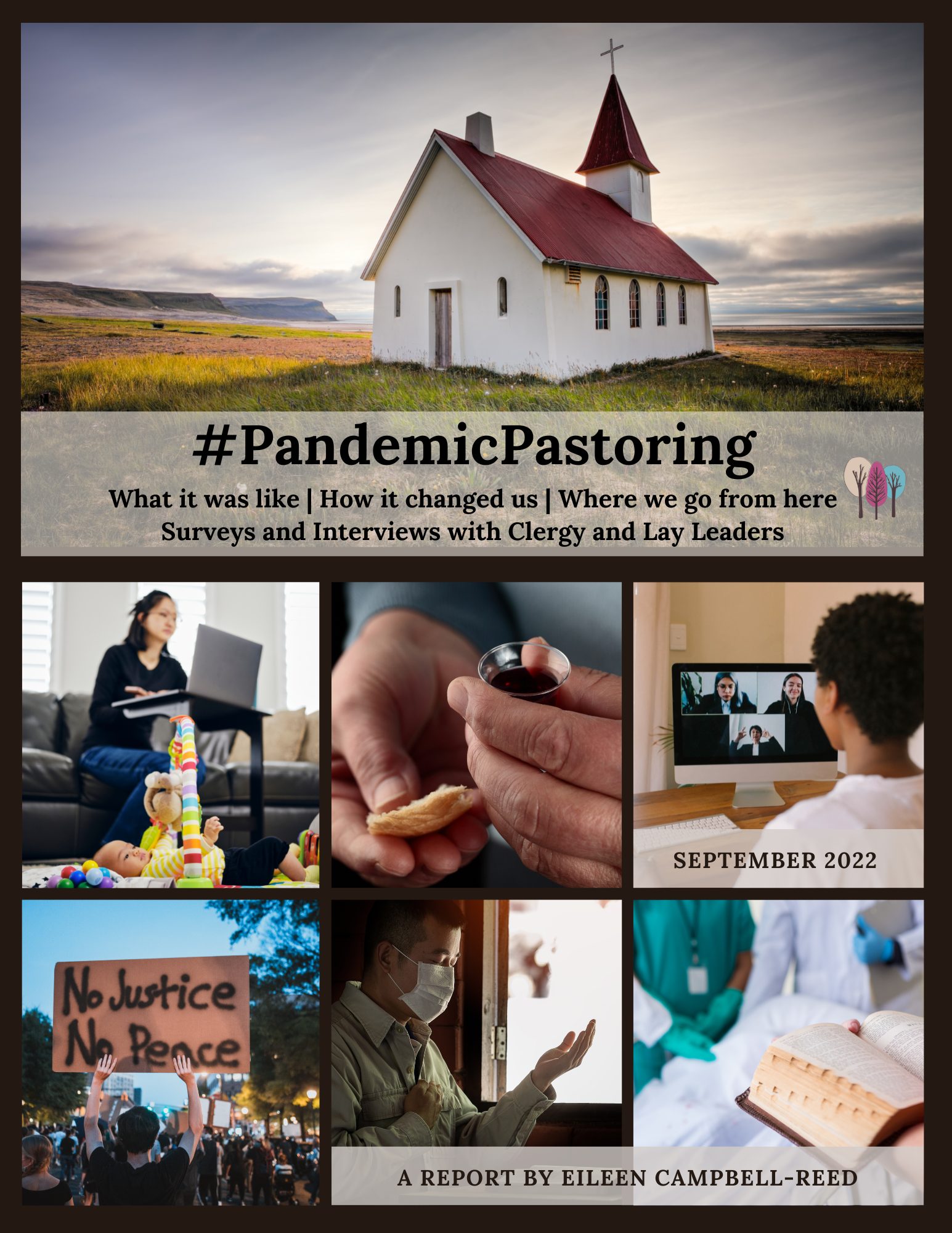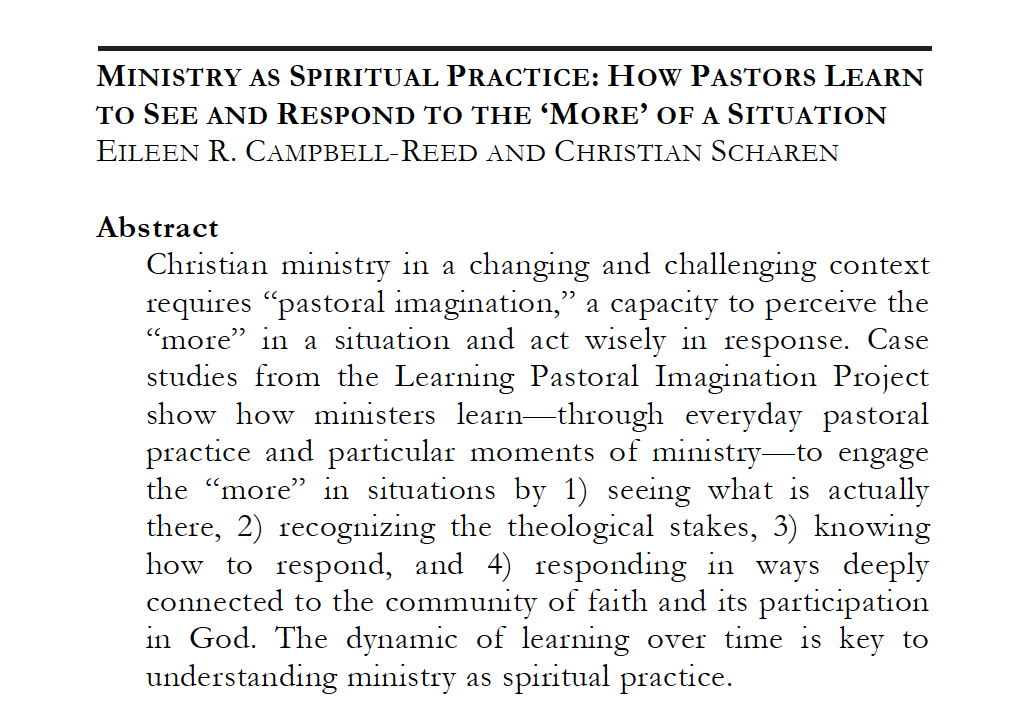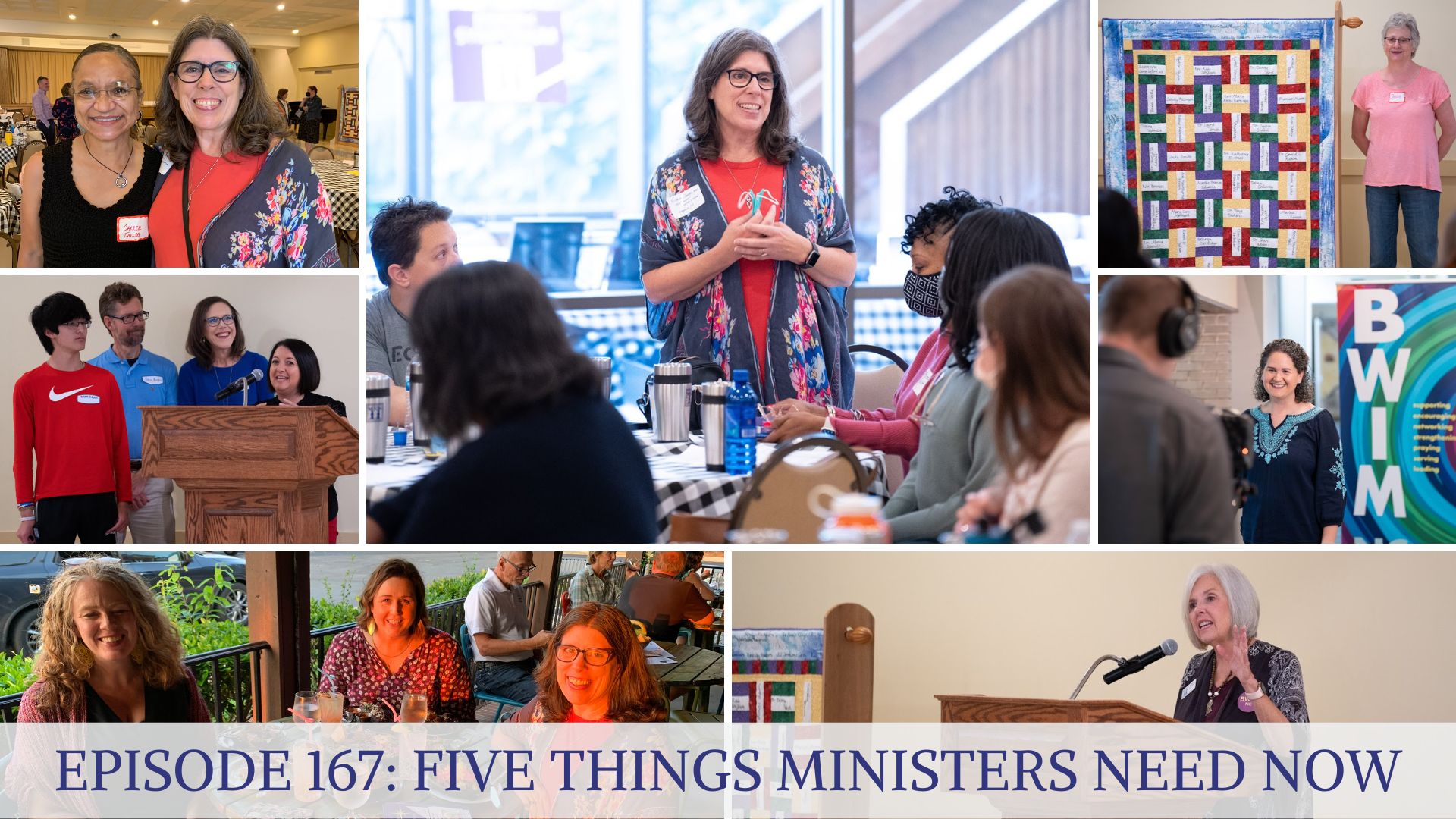The times we are living in remain profoundly challenging, so today we are launching a series on five things ministers need now. The world is somewhat deceptive for all its rush and efforts to get things “back to normal.” Yet nothing is really “going back” to what was in 2019. And the residuals of the last 2+ years can only be ignored to our peril.
 In the #PandemicPastoring Report and Webinar my most urgent points are 1) both context and practice of ministry have changed, and we are in a new era; and 2) the most urgent response we can make to this reality as individuals is to engage ministry as a spiritual practice.
In the #PandemicPastoring Report and Webinar my most urgent points are 1) both context and practice of ministry have changed, and we are in a new era; and 2) the most urgent response we can make to this reality as individuals is to engage ministry as a spiritual practice.
What does this look like?
To engage in ministry as a spiritual practice is not simply to be a holy or spiritual person who leads. Nor is it to teach people prayer and spiritual practices. These might both be important but to see and engage ministry as a spiritual practice is to recognize the spiritual character of the work and to participate in the very life of God.
Chris Scharen and I summarized ministry as a spiritual practice in an article we wrote a decade ago. 
Ministry as a Spiritual Practice is…
* Learning to see and engage the “more” of a situation.
* Seeing fully what is at stake in the situation. And then taking risk and responsibility for stepping into the moment and offering a pastorally and theologically wise and fitting response.
* Cultivating pastoral imagination for all the work, relationships, embodiment, and integration for ministry as a spiritual practice.
Read the full “Ministry as Spiritual Practice” article to learn more.
What Shall We Do?
Given this new era of ministry, and my plea to you to engage in ministry as a spiritual practice, something learned with time and experience, what are some concrete and practical steps you can focus on right now? Over the next five weeks and going through clergy appreciation month, I want to unpack five aspects of ministry as a spiritual practice that I believe will support you as you recover, heal, and lead through this time. In some ways the steps should be nothing new. But the questions are fresh: How are you doing them? How are you committed to ministry as a spiritual practice? What is sustainable and renewable rather than depleting or exhausting?
We would love to know what you think! I’ve created a short poll about kind of support you would find helpful below. You are welcome to participate. Feel free to use your first name, your initials, or a pseudonym.
Grief Work
One of the responses that rose to the top of the support list in surveys I conducted in 2021 – more than a year into the pandemic – was the desire for more space to process one’s own grief. Grief takes so many different forms. We’ve lost people dear to us to death. But we’ve also lost many aspects of our life together, small things and milestones, ways of living that are hard to name. We can’t keep pressing ahead without taking time to integrate these losses. It’s not about closure, but rather about finding ways to live honestly and creatively with our losses. It is about acknowledging and honoring our grief, which is another way of saying the loves of our lives that are lost or no longer present. I think you may find this article by my friend and colleague in pastoral theology, Dr. Joyce Ann Mercer, useful for how to think about grief in this way.
What needs grieving in your world right now?
Meaningful Connections
We not only need to grieve that which is lost, we also need to embrace more fully those who remain. We need our connections with friends and family, peers and mentors. This week I traveled to North Carolina to be with friends new and old, ministry peers, and academic colleagues. It was wonderful to meet people I had only connected with virtually over the past few years. And I was delighted to see friends who have been in my circles now for three-plus decades. It was so good for my soul to acknowledge our grief together, to share delicious food, to dream about new projects, to hug and elbow bump, and to laugh together.
Where have you leaned into meaningful connection lately?
Ritual Creation
We not only have to cope with our own grief, and lean more deeply into meaningful connections, we also need to create and curate rituals for this time. In particular, people in congregations and pastoral care settings need rituals to cope with the grief. Talking only takes us so far. We need the power that our tradition gives us when we celebrate baptism and communion together, pray and sing, and move our bodies in ritual space. There is power in ritual that transcends conversation and time. We need to draw on both our best traditions and our best improvisations to meet this moment. It is one of the arts and gifts of being a minister. To lead people with rituals offers them a container and space for marking this time.
How are you making use of ritual to care for and lead your people?
Sabbath Rest
In the #PandemicPastoring Report, I noted: “In 2021, Pastors told us four things were most important in the way of support: 1) more rest or sleep; 2) a break or time away; 3 / 4) more self-care and space for grief.” Ministers and lay leaders alike know that they need more rest, which is a central aspect of Sabbath. Rest includes more sleep, a break or time away, playing and laughing, doing nothing, and other forms of admitting we are not in charge of the world. Leaving God’s job to God. We may participate in the life of God, but we don’t own or control it.
Sabbath is not one more thing for the to do list. It is the antidote to the to do list. How are you practicing Sabbath?
Health Care
When ministers and lay leaders say they need “more self-care,” I think they are talking about quite a few different things. I believe they are talking about their mental and emotional well-being, and I also think they mean their basic health and day-to-day care of body, soul, mind, and relationships. Seeing the doctor, eating nutritious food, exercise, and sleep. It seems counterintuitive to give time and energy to this kind of care when life is so demanding , and yet without it we cannot do the big things we are called to do. In this past year we have shared the pandemic permission slips, and we still think they are worth sharing! Little reminders about doing little things, so we have the energy to do the bigger things that matter.
What attention are you giving to your health and well-being? How can you give yourself permission to prioritize your mental and physical health?
We will explore each of these five areas of ministry as a spiritual practice in the coming weeks. Invitations are going out to master practitioners in each area, and I look forward to continuing these conversations with you. I am grateful for you, dear minister. Cheers to your courage and your calling!




